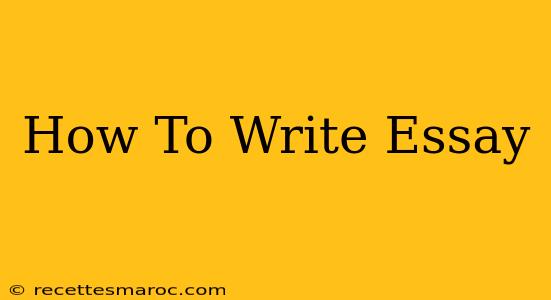So, you've been tasked with writing an essay. Don't panic! While it might seem daunting at first, essay writing is a skill that can be learned and mastered. This comprehensive guide will walk you through every step, from brainstorming to polishing your final draft. We'll cover everything you need to know to write a compelling and well-structured essay, regardless of your topic or subject matter.
Understanding the Essay Structure
The foundation of any successful essay is a strong structure. Think of it like building a house: you need a solid framework before you can add the finishing touches. A typical essay follows this structure:
1. Introduction: Grabbing the Reader's Attention
- Hook: Start with a compelling hook – a question, anecdote, surprising statistic, or a relevant quote to instantly grab your reader's attention.
- Background Information: Provide context for your topic, setting the stage for your argument.
- Thesis Statement: This is the most crucial part of your introduction. Your thesis statement clearly and concisely states your main argument or point of view. It acts as a roadmap for the rest of your essay. Make it strong, specific, and arguable.
2. Body Paragraphs: Supporting Your Argument
Each body paragraph should focus on a single supporting point related to your thesis statement. A typical structure for each body paragraph is:
- Topic Sentence: This sentence introduces the main idea of the paragraph and directly supports your thesis.
- Evidence: Provide evidence to support your topic sentence. This can include facts, statistics, examples, quotes from credible sources, or personal anecdotes (depending on the essay type).
- Analysis: Analyze your evidence and explain how it supports your topic sentence and, ultimately, your thesis statement. Don't just present evidence; explain its significance.
- Transition Sentence: Conclude the paragraph with a sentence that smoothly transitions to the next paragraph.
3. Conclusion: Summarizing and Leaving a Lasting Impression
Your conclusion should effectively wrap up your essay. It shouldn't introduce new information. Instead, focus on:
- Restating your thesis (in different words): Summarize your main argument.
- Summarizing your main points: Briefly reiterate the key supporting points from your body paragraphs.
- Concluding statement: Offer a final thought-provoking statement, a call to action, or a reflection on the broader implications of your topic.
Choosing a Topic and Researching Effectively
Before you start writing, you need a strong topic. If you're given a specific topic, great! If not, brainstorm ideas related to your interests or the subject matter. Once you have a topic, thorough research is essential. Use reputable sources like academic journals, books, and credible websites to support your arguments.
Writing Process Tips:
- Outline your essay: Create a detailed outline before you start writing. This will help you organize your thoughts and ensure a logical flow.
- Write a first draft: Don't worry about perfection in the first draft. Just get your ideas down on paper.
- Revise and edit: Once you've completed your first draft, revise it for content, organization, and clarity. Then, edit for grammar, spelling, and punctuation.
- Proofread carefully: Before submitting your essay, proofread it carefully one last time to catch any errors.
Mastering Essay Writing: Practice Makes Perfect
Writing effective essays is a process that requires practice. The more you write, the better you'll become at organizing your thoughts, constructing arguments, and expressing yourself clearly and concisely. Don't be afraid to seek feedback from teachers, peers, or writing centers. They can offer valuable insights and help you improve your writing skills.
This guide provides a solid foundation for writing a successful essay. Remember to tailor your approach to the specific requirements of your assignment and always strive for clarity, conciseness, and strong supporting evidence. Good luck!

